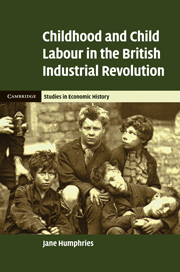1 - Introduction
Published online by Cambridge University Press: 06 December 2010
Summary
‘Perhaps as I tell you my story, which, with variations, is the story of hundreds of thousands of my East End neighbours and of millions of my brothers all over the country, you will begin to understand’ (Thorne, 1925?, p. 13). Will Thorne was born (1857) into poverty and illiterate until adulthood. He wrote his autobiography, fittingly titled My Life's Battles, to provide his readers with the background for his views and to explain his lifetime commitment to socialism. Thorne was branded, as he acknowledged, by his bitter experiences as a child worker. Such experiences were far from unique. Thorne's story, along with more than 600 other working-class autobiographies, constitutes the basis for this study. Quantitative and qualitative analysis of these memoirs provides new insight into the role that child labour played in the British industrial revolution and thereby into the process of industrialization itself.
The child worker was a central if pitiful figure in both contemporary and classic accounts of the British industrial revolution, but in modern economic history, the children who toiled in early mills, mines and manufactories have become invisible. The standard economic history textbook (Floud and Johnson, 2004), contains only five references to child employment, all but one of which derive from the rather peripheral chapter on ‘Household Economy’. As a topic of research, children's role in industrialization has become passé (Bolin-Hort, 1989). Clark Nardinelli's (1990) revisionist interpretation provided an exception that shocked traditional historians.
- Type
- Chapter
- Information
- Publisher: Cambridge University PressPrint publication year: 2010

